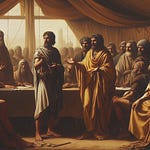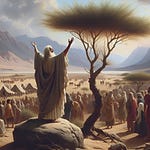Chapter Notes
Although life is a collection of experiences, some are repeatable and some are not.
In Genesis 48, we enter into one of those unrepeatable experiences as Jacob begins to say goodbye to this world.
Commentary
vv. 1–7 - It is not uncommon to find among the elderly a sense that the past seems more vivid than the present. We can see something of that in Jacob as he recalls old memories. But this is more than an old man reminiscing. Jacob is preparing to adopt the two sons of Joseph. He says in v. 3, “they shall be mine.” Different ideas may be given as the motivation for this, but between the folly of Reuben and Simeon, as well as Jacob’s love for Rachel (whom he mentions in v. 7), Jacob viewed Joseph as a firstborn son with the right to the firstborn birthright, meaning the double inheritance will be divided between Joseph’s two sons. Jacob’s mind then returns to Bethel. Many think he refers to the events of Genesis 28:10–22, but I think it is more likely to be Genesis 35:9ff. It states explicitly in Genesis 35 that God blessed Jacob (as it does in Genesis 48:3), and it is also around the time of Rachel’s death, which is mentioned in the same scene. Whatever the case, Jacob’s intention is to bring Joseph’s sons—who knew nothing but life in Egypt—into a greater sense of their right to the covenant blessings. They are young men by this stage, and both Jacob and Joseph are burdened for their souls.
vv. 8–16 - the language “who are these?” is not to be read as an inquiry from a place of ignorance, but as language similar to a formal wedding ceremony, in which it is asked, “Who gives this woman to be married to this man?” Such a question has an obvious answer, but in a formal or legal setting before witnesses, obvious questions and answers must be presented for the record. Joseph then brings his sons to Jacob at his request. Jacob then places his right hand on the youngest and his left hand on the oldest, and blesses them. In so doing, he signifies his adoption of them by saying, “let my name be named on them.” This action results in there being thirteen tribes of Jacob, but one of them, Levi, will not be given a land inheritance, meaning Israel will be divided between twelve tribes. But more than that, Hebrews 11:21 reveals this scene as one which best reflects Jacob’s faith. This may not have been the event we would have chosen, but the Holy Spirit does, because it summarizes Jacob’s faith. In vv. 15–16 Jacob believes that the one He believes in is a) the God of successive generations, b) the God which shepherds His people, c) the God which saves sinners.
vv. 17–22 - Jacob reflects concern for Joseph also, and wishes to strengthen his faith by giving him a special portion of land so that he feels his tie to Canaan. In fact, the word “portion” in v. 22 is literally ‘Shechem’ and would become not just the place where Joseph would be buried by Joshua, but the place where Christ would extend His saving grace to a Samaritan woman in John 4.
Application
Believers should not be hesitant to visit the dying. With the discovery that his father had taken ill, Joseph immediately sets aside every other responsibility and takes his two sons with him to see Jacob. Death is one of the strongest reminders of man’s need for redemption. Put yourself in its presence when you can, not only for the comfort of the dying, but for the instruction of your own soul.
Parents must prioritize the spiritual needs of their children. Joseph’s desire for his sons to be in the presence of Jacob and his submission to the adoption, indicate that he desired more for his sons than material prosperity. No doubt his sons had access to the best education in the world and that prestigious opportunities lay before them. But Joseph wants them to identify with the covenant family and God’s promises rather than the treasures of Egypt. This would have been a great comfort to Moses, and instructive to him who had to make a choice whether to suffer affliction with the people of God, or to enjoy the pleasures of sin for a season. Parents, what are your aspirations for your children? Are you helping them to understand the importance of Christ, His people, and the promises of God? Does your life teach them to love God’s kingdom?
Believers should recognize tokens of God’s faithfulness. Jacob’s reflections reveal a spirit of gratitude. E.g. in v. 11 Jacob remarks on the mercy shown to him, in that he was not merely permitted to see Joseph again, but his children as well. This is instructive. If you are discouraged, count your blessings. Pray that God will give you the sight necessary to see His hand of mercy, and live your life surprised by grace.
The love of adoption is uniform, but gifting is distinct. Jacob adopts Ephraim and Manasseh with the same love, but the blessing which indicated God’s plan for them was distinct. So it is in the gospel. God loves and adopts sinners with perfect equality because each is in union with Jesus Christ. Galatians 3:26 says, “For ye are all the children of God by faith in Christ Jesus.” But God has different purposes for every one of His children, and so He gifts them differently. This is not to be resented. If you feel like you have been shortchanged, it is likely that you have greater service to do in the kingdom than you realize. But even if your assessment is correct, there is a peculiar danger Jesus warned us against. Remember in the parable of the talents? It was the person with one talent who buried it in the ground rather than making use of it. Do not be so foolish. Give to God your five loaves and two fishes, seek the fullness of the Holy Spirit, and God will do more through your life than you might ever have imagined.
God does not act according to the wisdom of this world. Joseph could not understand why his father would cross his hands when blessing his sons. Similarly, we should struggle to understand why our Father in heaven would cross his hands in our case, imputing our sins upon the head of our older brother, and imputing the blessing of our older brother upon us. That happens in the gospel. My sins are laid on Christ, and His righteousness is credited to me. Bless God for the doctrine of counter imputation. As familiar as we may be in our knowledge of the gospel, we can rightly ascribe Isaiah 55:9 to God’s work of redemption, “For as the heavens are higher than the earth, so are my [God’s] ways higher than your [our] ways, and my [God’s] thoughts than your [our] thoughts.”
God’s presence is our comfort when loved ones die. Jacob reassures Joseph, “Behold, I die: but God shall be with you” (Gen. 48:21). At some point, our most treasured relationships on this earth will be halted by death. Perhaps you are struggling with the thought of losing one you love. Maybe they are very sick at this moment? You cannot stop their departure, but you can equip yourself for it when you know that “God shall be with you.” Make sure you are clothed with the victory of the gospel. It is only in Christ where death is made to blossom into life, and where suffering is crowned with glory. Trust in your King and He will take care of the rest.
“No choicer favor could fall upon ourselves than to see our children favored of the Lord. Joseph is doubly blessed by seeing Ephraim and Manasseh blessed.” — Charles Spurgeon











